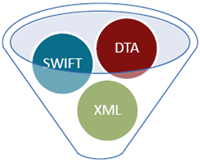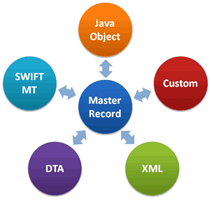
 @GlobalTrade Dynamic Message Converter (DMC) is middleware developed for financial institutions to convert trade messages between SWIFT MT, DTA and other custom XML standards. DMC can be used as a stand-alone application or integrated into existing messaging systems. DMC’s design is based on the concept of a “Master Record” and “Star Architecture” making it extremely flexible and highly expandable. It accommodates variations of the existing standards, such as SWIFT SCORE MT798 and ISO 20022 for corporate trade finance messages, and future formats.
@GlobalTrade Dynamic Message Converter (DMC) is middleware developed for financial institutions to convert trade messages between SWIFT MT, DTA and other custom XML standards. DMC can be used as a stand-alone application or integrated into existing messaging systems. DMC’s design is based on the concept of a “Master Record” and “Star Architecture” making it extremely flexible and highly expandable. It accommodates variations of the existing standards, such as SWIFT SCORE MT798 and ISO 20022 for corporate trade finance messages, and future formats.
DMC Features
- Property Mapping – DMC allows dynamic mapping of a message property to a business property. The mapping engine is based on XPath and/or regular expressions with technically unlimited flexibility. The engine includes message transformation logic, such as field splitting, merging, value substitution and others. DMC includes pre-defined transformation and mapping rules for the key SWIFT, DTA and XML properties.
- Message Validation – An unlimited number of validation rules per message property can be specified. The built-in validation engine is also capable of accepting and processing XPath and/or regular expressions making a set of rules for each property technically unlimited. Pre-defined rules covering the key SWIFT, DTA and XML validation types are also provided.
- SWIFT B2C Message Processing – DMC includes pre-configured message definitions for SWIFT MT798 messages used in B2C communication including index, detail and extension messages. Message bundle definitions can further be used to define and modify the relationship between index, detail and extension messages.
- SWIFT Message Extensions – Built-in logic ensures compliance with SWIFT message length restrictions by distributing message data across multiple messages. The logic controls the maximum length for the original message, extension message IDs, number of extension messages and data that should be moved to the extension message.
- Service Oriented Architecture – The Dynamic Message Converter is based on SOA architecture and implemented as a Web Service. It can be deployed as a standalone web service integrated into other web applications.
- Batch Processing of Incoming and Outgoing Messages – DMC can process files containing multiple SWIFT and/or DTA messages.
- BoleroXML – DMC includes handling of BoleroXML messages as implemented and used between corporate and financial institutions. Message element mapping and validation rules are fully configurable.
- Console Monitoring – DMC includes a web-based console for monitoring message conversion process. The console provides information about processed messages, messages pending conversions due to missing bundle parts and messages with errors. The console can also be used to manage message party information, such as, source and destination IDs, as well as preferred delivery channels and formats.
Star Architecture is based on the use of the Master Record and format-specific conversion templates. Universal and format-independent structure of the Master Record stores every property of each business object. Master Record properties are based on the Master Dictionary which is defined and configured using XML technology. The Dictionary describes message properties that need to be parsed or generated. Star Architecture combines Master Dictionary with configurable XML-based templates to define mapping and validation rules for the transformation of the Master Record data to and from various formats: SWIFT MT, DTA and XML. Star Architecture simplifies integration of DMC with the existing bank infrastructure by re-using existing back-office functionality to generate SWIFT, DTA or front-end XML messages.
Benefits
- Global electronic Export Documentary Credit database
- Discrepancy‐free documents
- Ability to turn receivables into cash quicker (DSO savings of 3 to 10 days)
- Improved efficiency in Export Documentary Credit handling
- Customized Export Documentary Credit approval process
- Improved monitoring and control
- Reduced operational risk
Hosting Options
In‐house installation. Corporates can install the system in‐house. This option offers greater security by having control over your own data in addition to easier integration with other in-house systems.
Service Provider. Corporates can choose to host the system at a data centre of a trusted IT service provider or financial institution. This option offers the added benefits of freeing up IT resources and allowing faster implementation.[/vc_column_text][/vc_column][/vc_row]



